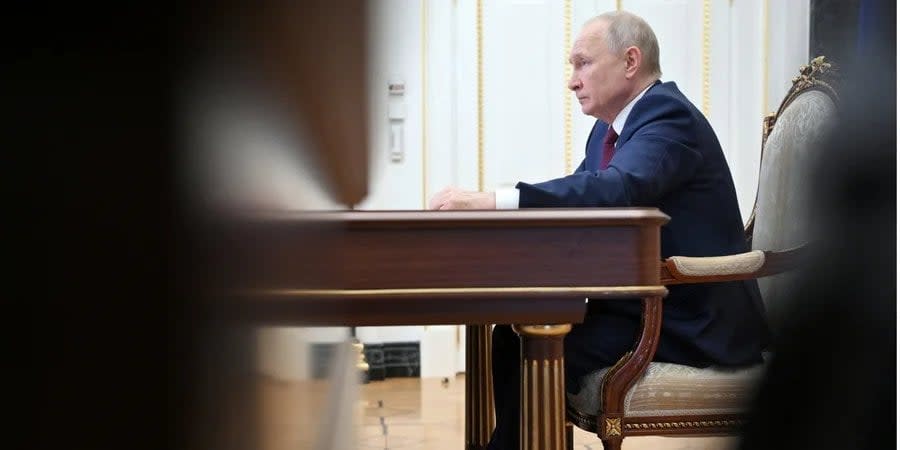Putin’s regime struggles to recover from coup attempt, says political analyst

- Oops!Something went wrong.Please try again later.
- Oops!Something went wrong.Please try again later.
- Oops!Something went wrong.Please try again later.
- Oops!Something went wrong.Please try again later.
Russian dictator Vladimir Putin’s regime has been profoundly shaken due to a loss of control after the coup attempt by the Wagner mercenary company and its leader, Yevgeny Prigozhin, a political analyst has told NV.
Pavel Baev, a professor at the Institute of Peace Research in Oslo, Norway, gave this opinion in his latest column for NV, published on July 5.
While initially condemning Prigozhin’s mutiny as “state treason” and a “stab in the back,” Putin is now attempting to portray a return to normalcy in Russian political affairs.
However, Baev argues that the vulnerability of Putin’s power and the erosion of his authority among the Russian populace, which displayed remarkable indifference to Prigozhin’s rebellion, have been glaringly exposed. Baev said Putin’s efforts to conceal the coup’s consequences would ultimately be futile.
Baev added that failed coups often lay the groundwork for more successful uprisings.
“Coincidentally, June 26 is the 70th anniversary of the (1953) Politburo meeting,” Baev noted.
“It was during this meeting that Lavrentiy Beria, the successor of the ruthless dictator Joseph Stalin, was overthrown. Beria was toppled by his ‘comrades’ Georgy Malenkov and Nikita Khrushchev, with the support of Marshal Georgy Zhukov.”
The Russian military leadership is an obligatory participant in any conspiracy aimed at seizing power, which is why Putin’s agents have recently been interrogating many suspected supporters of Prigozhin’s conspiracy, paying special attention to General Sergei Surovikin, who was praised for constructing “impregnable” defensive lines after the retreat from Kherson,” Baev said.
Read also: Gerasim and Raskolnikov: How to Understand the Russian Intellectual
“Defense Minister Sergei Shoigu and Chief of the General Staff Valery Gerasimov, both involved in a protracted public debate with Prigozhin, are unlikely to congratulate each other on the disbandment of the Wagner Group, as their authority within the officer corps has been significantly undermined,” he said
Baev sarcastically referred to Viktor Zolotov, the commander of the Russian National Guard, who claimed that his forces needed heavy tanks and artillery to repel the next coup attempt, as one of the “winners, according to Putin’s arbitral court decision,” after the recent turmoil.
“While Putin may highly value Zolotov’s blind loyalty, the expansion of another ‘praetorian guard’ can only happen at the expense of the regular army, which is increasingly under pressure from the advancing Ukrainian forces,” Baev said.
The course of the battle on the battlefield has not changed significantly due to the unrest in Russia, but the confusion in the Russian high command may hinder the deployment of reserves to counter possible breakthroughs, Baev said.
Read also: What awaits Wagner, Prigozhin, Lukashenko
Taking advantage of this confusion, Ukrainian forces are striking Russian command centers at medium range, and the likely decision by the United States to provide long-range missile systems, such as the MGM-140 ATACMS, may turn this disruption of command chains into a decisive advantage for Ukraine, Baev said.
European Union leaders and Western countries, in general, now have to seriously consider the risks of Russia’s defeat, as the Wagner coup attempt have revealed a greater weakness in Putin’s control over government structures than anticipated.
The issue causing the deepest concerns for many Europeans is the integrity of control over the Russian nuclear arsenal, Baev acknowledged.
While Prigozhin’s mutiny did not pose an immediate threat to this arsenal, Baev surmises that “the turmoil that another future attempt at a coup could create may have serious nuclear consequences.”
“Crossing the infamous nuclear threshold may still be far away, but the undeniable mischief at the Zaporizhzhya Nuclear Power Plant poses a real threat, and the ecological catastrophe caused by Russia’s undermining of the Kakhovka Hydroelectric Power Plant only highlights it.”
The placement of Russian nuclear warheads in Belarus adds a new serious uncertainty in terms of security, Baev said.
Read also: Russia rigs ZNPP reactor buildings with explosives – AFU
“The potential combination of individual mercenaries (Wagner Group members who may decide to relocate to Belarus) and nuclear weapons is unlikely to appear attractive to the Kremlin,” Baev noted.
The Putin regime felt the shock of losing control, and the Prigozhin-led coup did not provide the regime with any new energy or impulse for reforms. Different internal factions interested in maintaining internal stability must now reassess the Kremlin’s capability and competence in managing political crises, which are rooted in and caused by a consciously disastrous war against Ukraine, Baev said.
He emphasized that Western allies now need to strengthen their unity in supporting Ukraine and form a consensus on managing the risks of critical destabilization in Russia, which can be triggered by a series of minor defeats on far from strong defensive positions held by demoralized Russian troops with a tangled command structure.
“The strategic prospect of a protracted war remains central, but now it is enriched with a set of options with medium and high risks of destroying Russia’s corrupt and degraded governance,” Baev said.
We’re bringing the voice of Ukraine to the world. Support us with a one-time donation, or become a Patron!
Read the original article on The New Voice of Ukraine

